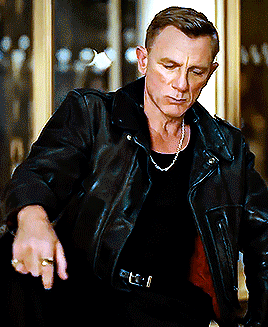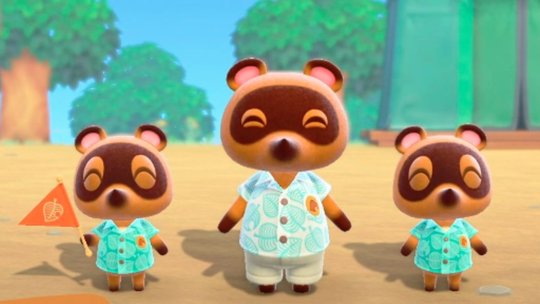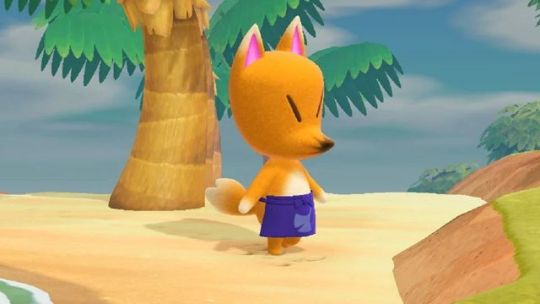Don't wanna be here? Send us removal request.
Photo










Belvedere Vodka Presents DANIEL CRAIG
11K notes
·
View notes
Text
i'll travel to places i've never been before with nothing but google maps and confidence as if google maps won't try to turn my journey into a survival horror at the first chance it gets
11K notes
·
View notes
Video
New Animal Crossing events and updates!
3K notes
·
View notes
Text
Animal Crossing has Gender-Specific Personalities, but Not in an Archaic Way
Animal Crossing places animal residents into quite specific, named gender roles. Your character used to be placed into stricter roles, with clothes and hairstyles being specific to "boys" and "girls", but as of the most recent installment Animal Crossing: New Horizons, animals do not even comment on the gender of human players except to refer to them by their chosen pronouns - "he" or "she". Male animal villagers have four specific personality types: "cranky", "jock", "lazy", and "smug". Female animal villagers also have four specific personality types: "uchi/sisterly", "peppy", "normal", and "snooty". While on the surface they may seem vastly different, each personality type has a parallel in the other gender.
Cranky villagers are typically out of touch with trends and act in a much more mature fashion to some other types. They tend to be more solitary and can come off as rude towards other villagers and even other players, but will warm up to and confide in your character if they work at it. Jock villagers are sports minded and self absorbed, constantly talking about working out and seen doing a variety of hobbies. If befriended, they tend to take on a big brother type of role to your character and giving them pep talks. Lazy villagers are usually found pursuing hobbies like fishing and bug catching. They are the nicest and most laid-back of the male villagers, often giving your character gifts. The last type, smug villagers, are friendly and considerate on the outside, but are vain and arrogant on the inside. They tend to gossip the most out of the male personality types and will often boast their accomplishments to others.
Uchi/sisterly villagers are typically very blunt when talking to others and can be quite stubborn. They may seem cold at first, but when your character warms up to them, they are fiercely protective and even provide medicine if they've been stung by wasps. Peppy villagers are high energy and high excitement, with interests in fashion and cooking. They perform the most variety activities of any personality type of either gender. Normal villagers are sweet, kind, and friendly to nearly everyone around them. They tend to take on a motherly role for your character. The last type, snooty villagers, are often designed to look like they are wearing makeup and talk about being high class. They are incredibly materialistic, and will help your character with their fashion if they warm up to them.
While there are gendered specifics to these roles, like the tendency for makeup with snooty villagers and the grumpy old man role of the cranky villagers, each personality has a parallel. Cranky and uchi/sisterly villagers both start out cold and blunt but warm up to your character with patience. Jock and peppy villagers are both incredibly outgoing and energetic with a penchant for being active. Lazy and normal villagers are both very relaxed and are easy for your character to befriend. Smug and snooty villagers are both vain and materialistic, but give your character advice after befriending them. Animal Crossing has done a better job over the course of each game in making the villagers follow the gender binary less in personality, but of course there's still work to do.
4 notes
·
View notes
Photo







Some photos of the characters from the last post!
4 notes
·
View notes
Text
Animal Crossing is a Japanese Game, but Here’s How it’s Obvious
The Animal Crossing series as a whole has always contained explicit elements of Japanese culture through its characters and collectibles. Three of its most famous characters, Tom Nook, Timmy, and Tommy, are Tanuki. The Tanuki are sort of raccoon-dogs in Japanese folklore known for their wealth and for the ability to transform items into Tanuki leaves. Tom Nook started the series as a shopkeeper but has stepped up in recent titles as a real estate salesman, giving his shop to Timmy and Tommy. In each game, your character owes debt to Tom Nook and is able to buy items, which are represented by leaf icons in your inventory, at his shop, Nook's Cranny. Your character can sell each and every item they get to the shop and it never runs out of money.
Another famous character in Animal Crossing is Kappa, who is a Kappa. A Kappa is a creature in Japanese folklore which, as children, warn human children about the dangers of the water. As adults, they can be tricksters, either by pulling pranks or by drowning people and animals. Kappa in Animal Crossing is based much more heavily on the child Kappas, providing your character with safe passage to your character's towns in past installments and across the ocean to his family's island in more recent titles.
The last big name character from the series is colloquially known as either "Crazy Redd" or "Jolly Redd" in the most recent game. He is a Kitsune, a type of fox in Japanese folklore known to be a trickster or a shape-shifter. In this case, Redd is a trickster, trying to scam your character out of their money by selling fake art to them and not providing refunds. Sometimes, your character will receive a real piece, but it is also rather suspicious that a fox would have the real Michelangelo's David.
Other characters sometimes appear as villagers that move into your character's town or island. Kabuki, a cat, is one such character, representative of the Kabuki style of drama theater through his fur markings. Zucker, an octopus, is another example, with his head representing a Japanese snack called takoyaki, which is made of octopus. The implication is one that I do not recommend thinking about.
One villager ties into items specific to the series: a bunny named Coco. At first, she may look creepy, seeing as her eyes and mouth appear to be empty, but she is representative of Japanese haniwa artifacts. Haniwa are statues that were found buried alongside the dead in Japanese tombs between 250-710 AD. No one knows what their purpose is nor was to this day. Coco is one such representation, but the items known as gyroids to English speakers also represent these statues. Most are found by digging them up from the ground, which is quite morbid when put into context. The most famous gyroid is Lloid, who helps to handle donations for structures across the various titles.
While much of the series' Japanese roots come in the form of bamboo, fruit trading, seasonal cherry blossoms, and various innocuous furniture items, the subtleties for those who are not Japanese are fun pieces of information to keep in mind and enrich the experience of the games even further.
6 notes
·
View notes
Text
Animal Crossing, Crunch, and Executive Bonuses
The Animal Crossing series is made by Nintendo, with the team responsible for it, Nintendo EPD (Entertainment, Planning, and Development) Group number 5, also being the team in charge of its Splatoon and Wii Sports series. For the rest of this blog entry, I will be focusing specifically on Animal Crossing: New Horizons, the latest title in the series. It was originally announced in a Nintendo Direct video on September 13th of 2018. Nintendo Directs are videos, either live or prerecorded, by Nintendo to announce content like new games, downloadable content, and even consoles. In this Nintendo Direct, the company announced that the game would be released some time in 2019. However, in a trailer at the Electronic Entertainment Expo, otherwise known as E3, in June of 2019, Yoshiaki Koizumi, the Deputy General Manager of Nintendo's EPD division, said that "to ensure the game is the best it can be, we must ask that you wait a little longer than we thought". The company decided to push the game back to March 20th of this year. Nintendo of America's president Doug Bowser explained that this was in an effort to avoid "crunch" and keep Nintendo's employees with a healthy work-life balance. After this announcement, the company saw a 3.5% loss in its stock market value, translating to a loss of nearly US$1 billion in value.
The crunch Bowser was referring to is when video game companies "encourage" (read: force) their employees to work long hours to meet deadlines. Crunch is an ever increasing problem in the video game industry. Many companies, such as Electronic Arts, known as EA, Rockstar Games, and BioWare have been accused of excessive crunch by critics such as Jim Sterling, but the majority of these companies see these periods of crunch as good for achieving milestones, which are incredibly difficult to predict in the video game industry, with BioWare even having a term within its studios to say that no matter how "tough" its games' production periods may be, everything will "come together" in the end: "BioWare Magic". Meanwhile, while its team worked on a game called Anthem, many team members either took several month long breaks or left the company altogether due to stress casualties as a result of the crunch.
In the same vein, many of these companies will have frequent layoffs of staff while their executives see major bonuses following releases. Activision Blizzard's CEO Bobby Kotick reported 2019 as a record year for the company before laying off about 800 employees, all the while giving the company's CFO a US$15 million bonus and saying the stockholders received a 9% increase in their values. Similarly, Gearbox's CEO Randy Pitchford told employees not to expect much in terms of bonuses after the wildly successful Borderlands 3. In comparison, when development started on the game, Pitchford took a US$12 million bonus.
This is the kind of environment that Nintendo seeks to avoid. Nintendo will delay its games to make sure that developers get the time they need to make a game in a healthy way, and its higher ups will take pay cuts to retain its employees. Nintendo's past president, the now deceased Satoru Iwata, had taken two 50% pay cuts, once after the markdown of the Nintendo 3DS and again after the Wii U saw disappointing sales numbers. Other executives had taken 20-30% cuts during these incidents. These executives recognize that the employees beneath them are not to blame for their mistakes and did the right thing. They frequently show empathy to their employees through their management choices, even when it does not go well for their investors.
Animal Crossing: New Horizons went on this past March to sell an estimated 5 million digital copies worldwide, as well as 3.3 million physical copies since April in Japan alone.
4 notes
·
View notes
Photo

The Animal Crossing series began in 2001 and has kept largely the same “story” - you are the only human in a world full of anthropomorphic animals, you have just moved to a new area, and you get a home to pay off throughout your playtime with a currency called “bells”. Your debt does not have a deadline (or if does, it is much longer than two years, as that is how long I left New Leaf alone), but there are plenty of ways to make money quickly, such as fishing, catching bugs, and even getting a job in some cases! In one game, you can work in a shop run by Tom Nook, the tanooki (or raccoon in the English versions) who you are indebted to. In New Leaf, you can get a job in the coffee shop run by a pigeon named Brewster.
Each subsequent game in the series gives you a larger role than in the last. While in the beginning, you played as a regular villager, New Leaf made you the mayor of your town (albeit not by a vote), and in the newest iteration New Horizons, you are the representative of the “deserted” island you live on. As mayor, you decided town ordinances like the “Bell Boom”, which nets you more money for selling items, or the “Beautiful Town”, which has residents water flowers more often and keeps flowers from dying overall. In New Horizons, you use your role as the resident representative to choose where resident tents, eventually homes, will go, where new buildings will be placed, and how the island will look overall.
I focus specifically on New Leaf and New Horizons because these are the two titles in the series that I have personally played. I started New Leaf a little over four years ago, calling my character “Bebe” after the nickname I got from my high school boyfriend and naming my town “Bebab” after the combination of “bebe” and “bab”, both of our nicknames for each other. It was an odd feeling loading the game last month and being called “Bebe” for the first time in three years. I got quite attached to my residents, favoring specifically a frog named Henry who wore a watermelon shirt that I had given him. He has a “smug” personality, meaning that he is sassy and confident. I got mad at him once because he asked me to make a chair sculpture for the town and then did not show up to the ceremony celebrating its completion. Rude.
I mentioned above that Henry is smug; each resident has the potential to have four personality types per gender. Male residents can be smug, cranky, jock, and lazy, while female residents can be snooty, peppy, normal, and uchi. Most of these types are fairly straightforward, but uchi is not for English speakers. Uchi is typically a big sister type, helping you if you have been stung by wasps and being generally supportive.
I have been playing New Horizons since midnight on the 20th of March when it came out, and I have just unlocked the ability to terraform the island and am creating a real neighborhood for my residents to live in. It will take another week to get it set up properly, as I need to move the residents’ houses to new locations and can only move one per day.
Pictured here is the current state of my campsite, which I have made into a memorial for a friend who passed away last month. I have seen a good amount of shooting stars there, which I like to say are from him. I think he wants to see me smiling.
0 notes